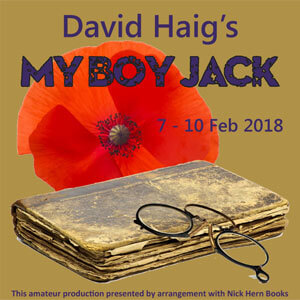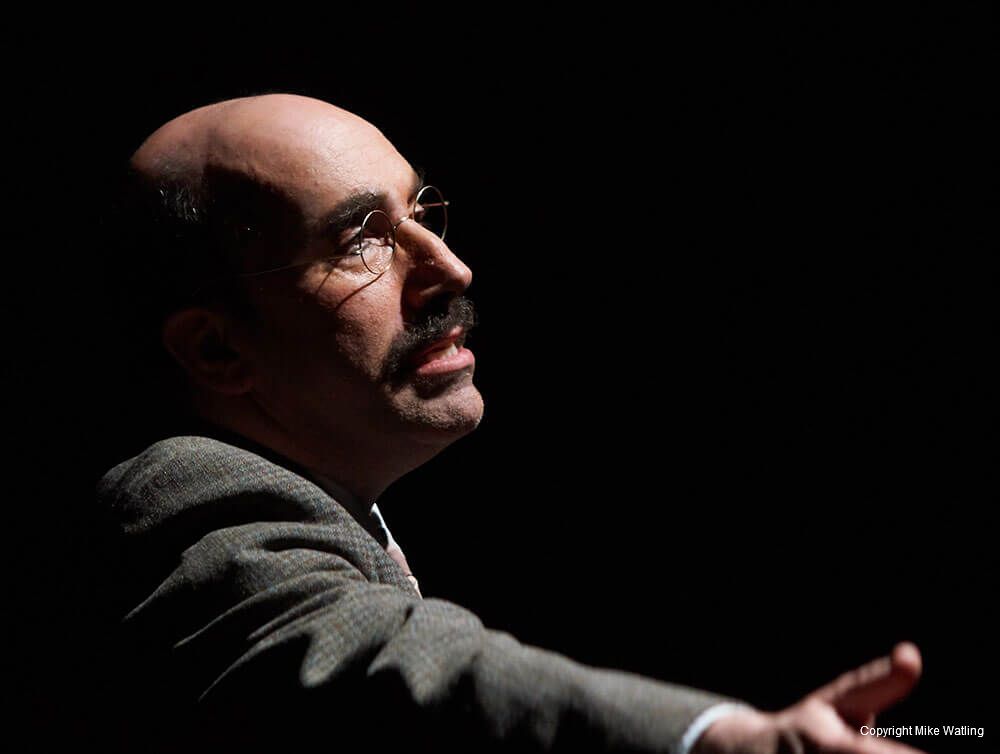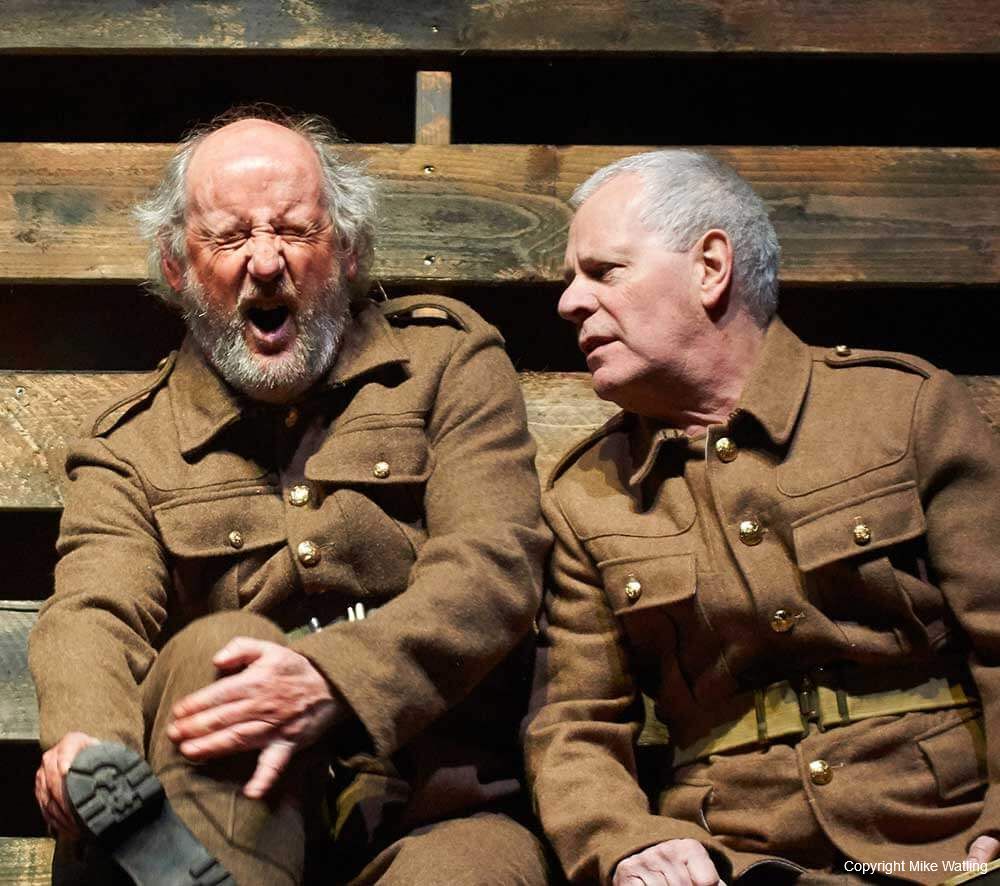|
MY BOY JACK by David Haig Banbury Cross Players The Mill Arts Centre, Banbury 7-10 February 2018 My Boy Jack is the story of Rudyard Kipling and his grief for his son, who was killed in the First World War. The bereavement forces Kipling to re-examine his own relationship with Jack and, ultimately, his attitude towards the war. Written as a stage play by the actor David Haig, and later turned into a film, My Boy Jack is a spare, moving and intense piece of theatre. I'm pleased to say that Banbury Cross Players' revival does it justice. Kerrie McCormick should take quiet satisfaction from her directorial debut (alongside co-director Helen Watson). When we first meet Rudyard Kipling, he is a keen supporter of the war effort and writes and speaks publicly to encourage young men to enlist in what he sees as a war for civilisation against German barbarism. His own teenage son Jack is also encouraged to join up, but he has failed his medicals for the Royal Navy and Army because of poor eyesight. Kipling uses his influence to get Jack a commission, nonetheless, in the Irish Guards. At the Battle of Loos in 1915, Jack is reported Missing in Action. Kipling is a large role to take on, and the production stands or falls with the ability of the actor playing the great man. Philip Fine did not let us down. After a slightly unsure opening scene, Fine blossomed into the role. For much of the play we had the 'Hail fellow, well met!' Kipling who thinks he is doing the best for his son and his country. Only later does he see another side to events; and then we see another side to him. He is shocked by his daughter's revelation that Jack's true motive in joining the army was not King and Country, but a desire to escape the suffocating environment of his family home. That is a dagger in Kipling's heart. His wife Carrie (Deborah Watson) administers a second. She mistakes Kipling's struggle to see some good in Jack's death as a lack of feeling. Wounded by such a remark, Kipling breaks down and reveals his deep grief over his son's death and his feelings of guilt that he was responsible for driving him to his end. It is the turning point in our understanding of Kipling and Fine handles it adeptly. The outpouring is intensely portrayed but never over the top. In the following scenes, we are back to the more familiar cheerfulness, but the tinge of melancholy lingers in Fine's performance. Jack Kipling is a young man who has to grow up very fast. Joe Deakin successfully takes the character from awkward teenager, frustrated by his father's micromanagement, to cub second lieutenant, battling both his own fears and the rebelliousness of his Irish troops to take them over the top to almost certain death. A young talent to watch. Dani Turner, as Kipling's daughter Elsie (called by her nickname 'Bird'), brought a huge injection of energy into the production from her opening scene onwards. Her presence on stage seemed to crank up the rest of the cast, who had made a competent, but slow start, and show them, and us, just how it should be done. By turns cheeky, rebellious and loving, Elsie is not afraid to tell her father how much she disapproves of his ambition of getting Jack to the join the Army and face front line action. Dani Turner gave us an Elsie unafraid of her emotions, devotedly loyal to her brother, and fun to be with. You'd probably want her sitting next to you at a dinner party! Deborah Watson's Carrie Kipling started slowly but picked up as the first act progressed. Kipling's wife provides an emotional anchor for her children as well as opposition to Rudyard's military ambitions for their son. Watson had an attractive stillness about her performance that worked well. What I would have liked to see a little more was greater warmth in Carrie's relationship with Elsie and Jack to provide a contrast with the conflict the children had with their father. Something for the directors to mull over perhaps. Guardsman Bowe (John McCormick), a farmer from County Clare, Ireland, serves in Jack's platoon. We see him first in the trenches in an ensemble scene with two other Irish Guards (played by Jem Turner and David Hornsby with foul-mouthed stroppiness and resignation respectively). But Bowe's main appearance comes two years later in the Kiplings' library, as a shell-shocked invalid who has half lost his mind. Kipling has spent the years since Jack's disappearance interviewing hundreds of soldiers for news of his son's last moments. Guardsman Bowe brings the dreadful news that at least gives Jack's parents the closure they seek. For me, McCormick's performance was a highlight of the evening. A sustained, demented, rambling that circles round the piece of information that Rudyard and Carrie seek, going closer then backing away, repeatedly, as if from a candle flame, until the final reveal. The performance kept the emotional intensity going right to the end.
Chris Garrett deserves especial praise for his simple but ingenious set design. An Edwardian library in Kipling's 17th century Sussex home that literally splits in two to reveal a trench on the Western Front, capturing the claustrophobia of that hell-hole. Credit also to John Hicks and Linda Shaw for their atmospheric lighting and to Michiel van Niekerk for soundscapes that brought us the unceasing rain and explosions of the battlefield. Rob Hall's projections of film footage from the First World War between scenes added to the atmosphere without falling into the trap of using technology for the sake of it. My Boy Jack was an enjoyable evening out (if that's the right word) and Banbury Cross Players are to be congratulated on their choice of a piece that does not seek to demonise anyone, but to shine a light on the proper subject of art: the human condition. Photographs: Courtesy and Copyright Mike Watling
0 Comments
Leave a Reply. |
About the Author
Mike Lord has been involved with amateur theatre for over twenty years, mainly as an actor but also, more recently, as a director. Archives
July 2019
Contact me
Please use the Contact Form for anything apart from comments on blog posts. |




 RSS Feed
RSS Feed
